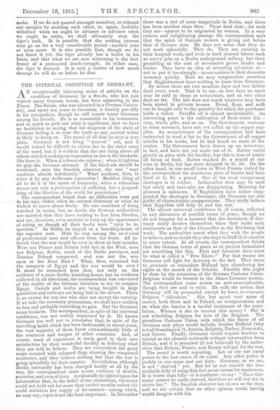TOPICS OF THE DAY.
THE MILITARY SITUATION.
IN writing last week of the military situation we ventured to take a line which then must have seemed a piece of impertinent optimism to many of our readers. We found it impossible to feel a sense of even " local despair " in regard to the retreat of the Allies upon Salonika and their sea base—a retreat which we felt sure could be conducted with perfect safety. We further ventured to predict that the Allies, by means of a series of field fortifications having the valley of the Vardar on their left, of the Struma on their right, and the sea and the three- pronged peninsula of Chalcidice in their rear, would be able to provide a place of arms such as Wellington possessed in the Peninsula—i.e., could make a Torres Vedras in Macedonia. This is almost exactly what is happening. The retreat has been safely accomplished, and, as Mr. Roosevelt used to say about the Panama Canal, we and the French are " making the dirt fly" in the trench lines in the area north of Salonika, an area from which the Greeks halve already withdrawn their troops. At the moment the bulk of the Allied Army are resting on a prepared position just within the Greek frontier, and there it is quite possible they will stop, secure in the knowledge that they have always got what we may call the Salonika fortifications as a second line to fall back upon. Once more let us ask our readers to look at the situation, not merely from the point of view of the Allies, but from that of the Germans. How does the Balkan situation appear to them, not, of course, when they are concotting wireless gasconade, but in the privacy of the Map Room of the Headquarters of the General Staff t It is our belief that if you could get an officer of the supreme German War Council to speak the truth, he would tell you that the presence of • strong and undefeated army at Salonika bide fair to upset the whole of the German scheme for dealing with the Balkans and Turkey. As long as that army remains at Salonika it is on the German flank, and there- fore a perpetual menace. A force may issue from behind the Salonika lines to cut those German communications between Constantinople and the Danube which have been established with such trouble and such risk by the Central Powers. Again, a force at Salonika creates a very special menace for Bulgaria. Instead of the Balkan), being cleared of their enemies, the Bulgarians see before them a force which may at any moment, and almost certainly will if the Germans become " occupied elsewhere," strike a blow at the heart of Bulgaria. So great, indeed, is the menace of the Salonika force that one could well understand the Germans, Turks, and Bul- garians agreeing that before they enter upon their great schemes of " passing the Desert " in order to invade Egypt, of driving us out of the Persian Gulf, or of invading Russia through Armenia, or whatever may be the last grandiose plan of the General Staff, they must first pluck the thorn out of the flesh and destroy once and for all "the poisonous interlopers of the Chersonese." That, of course, was just what Napoleon was always saying and trying to get his Generals to do in the case of Wellington's " contemptible little Army," which would keep dodging in and out of the lines of Torres Vedras. We can, then, under- stand the Germans feeling far from happy at the idea of having to beat their heads against the Salonika lines without an absolutely overwhelming force of the kind they employed to rush Namur or Antwerp. For the Germans have not got an overwhelming force of this kind. Unless, too, we are greatly mistaken, such force as they have got in the Balkans is at the moment bitterly wanted elsewhere. We have heard very little of late of the Russian forces in Bessarabia and of the threatened invasion of Bulgaria, but we should not be surprised to learn that the Germans were becoming alarmed by this feature of the situation, and that the troops of the Central Powers will have to be recalled from Macedonia in order to meet this new menace. As the very striking telegram from Athens in Thurs- day's Times suggests, if the Germans find that they have a pressing appointment in the North which they cannot postpone, the Bulgarians may also find that they have urgent business in the same direction. If they do, the Allies will very soon find that they have nothing formidable in front of them, and will be quick to seize the opportunity and to begin an offensive campaign in sympathy with the Russians. But if a Russian force were to advance from the North into Bulgaria and a French and British force from the South, the Germans, to pursue the old metaphor, would be between the two jaws of the pincers. That being so, even though the Germans are anxious to move, it is quite possible that they will have to get troops from else- where to meet the Russian danger, and will be forced to sit in the snow outside our Salonika lines lest worse things befall them. If this happens, the Salonika expedition will have well justified itself, for it will be holding up a force considerably larger than itself and under favourable condi- tions. Meanwhile the Serbian Army, aided and supported by the eighty thousand Italians who are in process of landing in Albania, will have pulled themselves together, and will be ready to issue forth from the mountains to attack the Bulgarians at Monastir, or else to be placed on transports and brought round to Salonika. Before we end our review of the general military situa- tion we must deal, though it can only be very shortly, with the menace to Egypt. Undoubtedly the Germans and Turks, or rather the Turks under German direction, are going to launch a really serious attack upon Egypt, an attack planned with great care and supported by desert railways, an attack which is very likely to be launched not merely on the El-Arish route, which was that attempted last year, but also through the Sinaitio Peninsula. This attack will, of course, be based on the Hedjaz Railway. Though we see all the anxieties and dangers of such an attack, and fully understand the risks, we believe that that invasion is on the whole not to be dreaded, but indeed should be welcomed as likely to bring ruin on its planners. If we have made, as we must assume we have made, full preparations along the line of the Suez Canal, we ask for nothing better than that the Germans and Turks should knock their heads against our lines and engage in a new example of trench warfare in which they will have their backs to a waterless desert, with, at the very most, two lines of attenuated desert railway and no lateral communication, not even a road, while we shall have Egypt behind us and all its supplies, including water. What is best of all, we shall have the lateral communication, first, of the Suez Canal with its flotillas of gunboats—i.e., floating batteries of heavy artillery which can be moved up and down exactly as they are wanted—and, further, a railway running parallel to the Canal, which can be used to reinforce our line at any point and " teach the doubtful battle where to rage." At the same time, both our flanks will rest upon the sea, which means upon British squadrons. If croakers ask us how we are going to guard a line of a hundred miles with, say, only a quarter of a million troops against half-a-million Turks and Germans, our answer is : " Look at the map." The Germans cannot attack across lakes or marshes or inundated ground. This means that, of the whole course of the Suez Canal, Nature and Art have denied to the assailants nearly half, and that there is only a front of about sixty miles where the Canal borders good hard sand, and so where an attack can be made under favourable conditions. If, after our ex- periences of the German attack last February, those sixty miles have not been fortified so strongly as to be well- nigh invulnerable to any attack that can be brought against them, all wo can say is that somebody ought to be hanged. But of course those preparations have been made, though very naturally they have not been trumpeted in the newspapers. If we were asked to sum up the military situation, and may be allowed to do so in metaphor, we should say that the Germans are in the position of a tiger which has been gradually surrounded by the toils of the hunters and is now making dashes from side to side with desperate courage and energy in order to force an escape. Every now and then the hunters with their stakes and nets have to fall back, but never so far that they cannot go on again. The tiger sprang at the Western obstacles, and failed. Then ho sprang at the North-Eastern, and failed again. Now another mad rush is being made to the South-East, and that we predict will fail also, even if we assume a high degree of stupidity in our ways of meeting the rush—an assumption which we by no means think it necessary to make. If we do not quarrel amongst ourselves, or exhaust our energies by scolding each other, or, again, foolishly withdraw when we ought to advance or advance when we ought to retire, we shall ultimately stop the tiger's rush. It is possible that the rushing process may go on for a very considerable period—another year or even more. It is also possible that, though we do not know it yet, the tiger already has a bullet in his brain, and that what we are now witnessing is the first frenzy of a protracted death-struggle. In either case, the tiger is doomed. It is only a matter of how much damage he will do us before he dies.











































 Previous page
Previous page